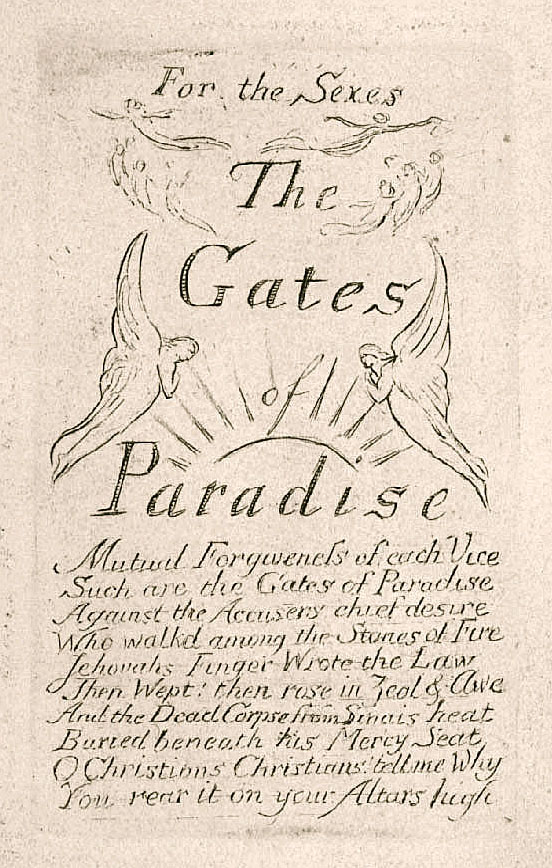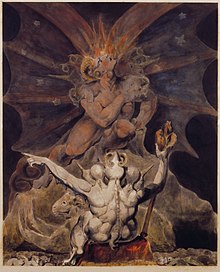This post is from Chapter 6 of Ram Horn' with Gold.
Ezekiel
If a poll were taken to choose the most obscure of the major books of the Bible, Ezekiel in the Old Testament and Revelation in the New might win by a wide margin. Strangely enough these very books seemed to mean the most to Blake. Their meanings are largely symbolic; Blake adopted their symbols and strenuously commented upon their meanings.
In his major work, 'Jerusalem', Blake took a great deal from Ezekiel: the structural format, the oratorical style, the dialectic of judgment and grace. But he used Ezekiel's style and material to refute Ezekiel's vision of a jealous and punishing God.
The first chapter of Ezekiel contains his definitive epiphany, the encounter with God that initiated and sustained his prophetic activity. The vision of the four living creatures, the wheels, the fiery chariot, all are the trappings of the Shekinah, the Glory of God. This vision originally empowered Ezekiel to prophesy; it recurred throughout his prophetic life.
In a climactic scene shortly
before the destruction of Jerusalem the prophet saw it hovering
over the Temple and departing (read Ezekiel 10 with special
attention to verse 18). Years later he
saw it when returning to Jerusalem as
the liberated pilgrims arrived from Babylon. (Ezekiel 43)
Ezekiel 10
[14] And every one had four
faces: the first face was the face of a cherub, and the second
face was the face of a man, and the third the face of a lion,
and the fourth the face of an eagle.
[15] And the cherubims were lifted up. This is the living
creature that I saw by the river of Chebar.
[16] And when the cherubims went, the wheels went by
them: and when the cherubims lifted up their wings to mount up
from the earth, the same wheels also turned not from beside
them.
[17] When they stood, these stood; and when they were
lifted up, these lifted up themselves also: for the spirit of
the living creature was in them.
[18] Then the glory of the LORD departed from off the
threshold of the house, and stood over the cherubims.
[19] And the cherubims lifted up their wings, and mounted
up from the earth in my sight: when they went out, the wheels
also were beside them, and every one stood at the door of the
east gate of the LORD's house; and the glory of the God of
Israel was over them above.
Ezekiel 43
[1] Afterward he brought me to the gate, even the gate that looketh toward the east:[2] And, behold, the glory of the God of Israel came from the way of the east: and his voice was like a noise of many waters: and the earth shined with his glory.
[3] And it was according to the appearance of the vision which I saw, even according to the vision that I saw when I came to destroy the city: and the visions were like the vision that I saw by the river Chebar; and I fell upon my face.
[4] And the glory of the LORD came into the house by the way of the gate whose prospect is toward the east.
[5] So the spirit took me up, and brought me into the inner court; and, behold, the glory of the LORD filled the house.
[6] And I heard him speaking unto me out of the house; and the man stood by me.
[7] And he said unto me, Son of man, the place of my throne, and the place of the soles of my feet, where I will dwell in the midst of the children of Israel for ever, and my holy name, shall the house of Israel no more defile, neither they, nor their kings, by their whoredom, nor by the carcases of their kings in their high places.
Blake took Ezekiel's living creatures (zoas in Greek) as the subject of his epic poem, 'The Four Zoas'. He humanized the Zoas and enacted through them the divisive tendencies of the human psyche which have led to the fracture and fall of Mankind. With their fall Blake's Zoas became the "rulers of the darkness of this world". As you study 4Z, keeping always in mind the biblical source, you become aware that it all relates to Ezekiel's vision of God.
The striving found in 4Z was interrupted by the Moment of Grace. This led to a radical reorientation of Blake's theology. He didn't change his mind about Ezekiel's God, but he met a new and more loving God in the person of Jesus. In 'Jerusalem' he gave the most overt and candid evaluation of the relationship between these two visions. The African American spiritual has it that Ezekiel saw the wheel. Here, in the language of Old Testament prophecy, Blake tells us what the Wheel has meant to Mankind:
Plate 77 of 'Jerusalem' might well be considered Blake's valedictory: he tells us pretty plainly the meaning of true religion:
"I stood among my valleys of the south
And saw a flame of fire, even as a WheelOf fire surrounding all the heaven: it went
From west to east, against the current of
Creation, and devour'd all things in its loud
Fury & thundering course round heaven & earth.
By it the Sun was roll'd into an orb,
By it the Moon faded into a globe
Travelling thro' the night; for, from its dire
And restless fury, Man himself shrunk up
Into a little root a fathom long.
And I asked a Watcher & a Holy-one
Its Name; he answered: "It is the Wheel of Religion."
I wept & said: "Is this the law of Jesus,
"This terrible devouring sword turning every way?"
He answer'd: "Jesus died because he strove
"Against the current of this Wheel; its Name
"Is Caiaphas, the dark Preacher of Death,
"Of sin, of sorrow & of punishment:
"Opposing Nature! It is Natural Religion;
"But Jesus is the bright Preacher of Life
"Creating Nature from this fiery Law
"By self-denial & forgiveness of Sin.
"Go therefore, cast out devils in Christ's name,
"Heal thou the sick of spiritual disease,
"Pity the evil, for thou art not sent
"To smite with terror & with punishments
"Those that are sick, like to the Pharisees
"Crucifying & encompassing sea & land
"For proselytes to tyranny & wrath;
"But to the Publicans & harlots go,
"Teach them True Happiness, but let no
curse
"Go forth out of thy mouth to blight their peace;
"For Hell is open'd to Heaven: thine eyes beheld
"The dungeons burst & the Prisoners set free."
Here Blake with unparalleled eloquence has set forth the opposition between the God of Wrath and the God of Mercy, the dark Preacher of Death and the bright Preacher of Life. Mankind in every age has turned Ezekiel's wheel into a juggernaut to enforce a worldly solidarity under the banner of priest and king. And every age has had its dissenters who strove against it and were all too often crushed.






